Related Research Articles

The Batavi were an ancient Germanic tribe that lived around the modern Dutch Rhine delta in the area that the Romans called Batavia, from the second half of the first century BC to the third century AD. The name is also applied to several military units employed by the Romans that were originally raised among the Batavi. The tribal name, probably a derivation from batawjō, refers to the region's fertility, today known as the fruitbasket of the Netherlands.

The Germanic peoples were historical groups of people that once occupied Northwestern and Central Europe and Scandinavia during antiquity and into the early Middle Ages. Since the 19th century, they have traditionally been defined by the use of ancient and early medieval Germanic languages and are thus equated at least approximately with Germanic-speaking peoples, although different academic disciplines have their own definitions of what makes someone or something "Germanic". The Romans named the area belonging to North-Central Europe in which Germanic peoples lived Germania, stretching east to west between the Vistula and Rhine rivers and north to south from southern Scandinavia to the upper Danube. In discussions of the Roman period, the Germanic peoples are sometimes referred to as Germani or ancient Germans, although many scholars consider the second term problematic since it suggests identity with present-day Germans. The very concept of "Germanic peoples" has become the subject of controversy among contemporary scholars. Some scholars call for its total abandonment as a modern construct since lumping "Germanic peoples" together implies a common group identity for which there is little evidence. Other scholars have defended the term's continued use and argue that a common Germanic language allows one to speak of "Germanic peoples", regardless of whether these ancient and medieval peoples saw themselves as having a common identity. While several historians and archaeologists continue to use the term "Germanic peoples" to refer to historical people groups from the 1st to 4th centuries CE, the term is no longer used by most historians and archaeologists for the period around the Fall of the Roman Empire and the Early Middle Ages.
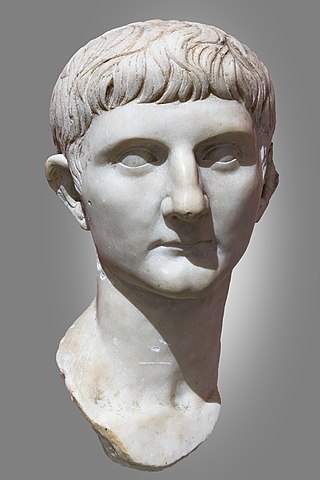
Germanicus Julius Caesar was an ancient Roman general and politician most famously known for his campaigns in Germania. The son of Nero Claudius Drusus and Antonia the Younger, Germanicus was born into an influential branch of the patrician gens Claudia. The agnomen Germanicus was added to his full name in 9 BC when it was posthumously awarded to his father in honor of his victories in Germania. In AD 4 he was adopted by his paternal uncle Tiberius, himself the stepson and heir of Germanicus' great-uncle Augustus; ten years later, Tiberius succeeded Augustus as Roman emperor. As a result of his adoption, Germanicus became an official member of the gens Julia, another prominent family, to which he was related on his mother's side. His connection to the Julii Caesares was further consolidated through a marriage between him and Agrippina the Elder, a granddaughter of Augustus. He was also the father of Caligula, the maternal grandfather of Nero, and the older brother of Claudius.

Arminius was a chieftain of the Germanic Cherusci tribe who is best known for commanding an alliance of Germanic tribes at the Battle of the Teutoburg Forest in AD 9, in which three Roman legions under the command of general and governor Publius Quinctilius Varus were destroyed. His victory at Teutoburg Forest precipitated the Roman Empire's permanent strategic withdrawal from Germania Magna, and modern historians regard it as one of Rome's greatest defeats. As it prevented the Romanization of Germanic peoples east of the Rhine, it has also been considered one of the most decisive battles in history and a turning point in human history.

The Cherusci were a Germanic tribe that inhabited parts of the plains and forests of northwestern Germany in the area of the Weser River and present-day Hanover during the first centuries BC and AD. Roman sources reported they considered themselves kin with other Irmino tribes and claimed common descent from an ancestor called Mannus. During the early Roman Empire under Augustus, the Cherusci first served as allies of Rome and sent sons of their chieftains to receive Roman education and serve in the Roman army as auxiliaries. The Cherusci leader Arminius led a confederation of tribes in the ambush that destroyed three Roman legions in the Teutoburg Forest in AD 9. He was subsequently kept from further damaging Rome by disputes with the Marcomanni and reprisal attacks led by Germanicus. After rebel Cherusci killed Arminius in AD 21, infighting among the royal family led to the highly Romanized line of his brother Flavus coming to power. Following their defeat by the Chatti around AD 88, the Cherusci do not appear in further accounts of the German tribes, apparently being absorbed into the late classical groups such as the Saxons, Thuringians, Franks, Bavarians, and Allemanni.

Germania, also called Magna Germania, Germania Libera, or Germanic Barbaricum to distinguish it from the Roman province of the same name, was a historical region in north-central Europe during the Roman era, which was associated by Roman authors with the Germanic people. The region stretched roughly from the Middle and Lower Rhine in the west to the Vistula in the east. It also extended at some point as far south as the Upper and Middle Danube and Pannonia, and to the known parts of southern Scandinavia in the north. Archaeologically, these people correspond roughly to the Roman Iron Age of those regions. While dominated by Germanic people, Magna Germania was also inhabited by a few other Indo-European people.

An Irminsul was a sacred, pillar-like object attested as playing an important role in the Germanic paganism of the Saxons. Medieval sources describe how an Irminsul was destroyed by Charlemagne during the Saxon Wars. A church was erected on its place in 783 and blessed by Pope Leo III. Sacred trees and sacred groves were widely venerated by the Germanic peoples, and the oldest chronicle describing an Irminsul refers to it as a tree trunk erected in the open air.

Germanic paganism or Germanic religion refers to the traditional, culturally significant religion of the Germanic peoples. With a chronological range of at least one thousand years in an area covering Scandinavia, the British Isles, modern Germany, and at times other parts of Europe, the beliefs and practices of Germanic paganism varied. Scholars typically assume some degree of continuity between Roman-era beliefs and those found in Norse paganism, as well as between Germanic religion and reconstructed Indo-European religion and post-conversion folklore, though the precise degree and details of this continuity are subjects of debate. Germanic religion was influenced by neighboring cultures, including that of the Celts, the Romans, and, later, by the Christian religion. Very few sources exist that were written by pagan adherents themselves; instead, most were written by outsiders and can thus present problems for reconstructing authentic Germanic beliefs and practices.

Ripuarian or Rhineland Franks were one of the two main groupings of early Frankish people, and specifically it was the name eventually applied to the tribes who settled in the old Roman territory of the Ubii, with its capital at Cologne on the Rhine river in modern Germany. Their western neighbours were the Salii, or "Salian Franks", who were named already in late Roman records, and settled with imperial permission within the Roman Empire in what is today the southern part of the Netherlands, and Belgium, and later expanded their influence into the northern part of France north of the Loire river, creating the Frankish empire of Francia.
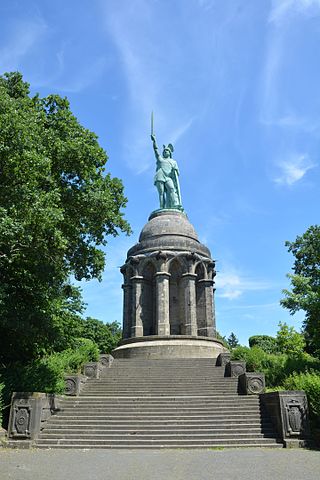
The Hermannsdenkmal is a monument located southwest of Detmold in the district of Lippe, in Germany. It stands on the densely forested Grotenburg, sometimes also called the Teutberg or Teut, a hill in the Teutoburger Wald range. The monument is located inside the remains of a circular rampart.
The Aesti were an ancient people first described by the Roman historian Tacitus in his treatise Germania. According to Tacitus, the territory of Aesti was located somewhere east of the Suiones (Swedes).
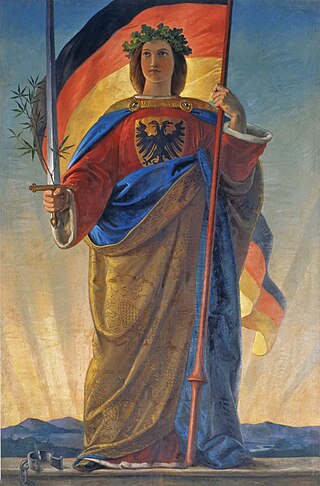
Germania is the personification of the German nation or the Germans as a whole. Like many other national personification symbols, she appeared first during the Roman Era. During the Medieval era, she was usually portrayed as one of the lands or provinces ruled by the emperors of the Holy Roman Empire, and not as the most prominent but in a subordinate position to imperial power and other provinces. Around 1500, together with the birth of the Holy Roman Empire of the German Nation, Emperor Maximilian I and his humanists reinvented her as Mother of the Nation.
The mythology of the modern-day Netherlands, Belgium and Luxembourg has its roots in the mythologies of pre-Christian cultures, predating the region's Christianization under the influence of the Franks in the Early Middle Ages. At the time of the Roman Empire and in the Early Middle Ages, some of the resident peoples of the Low Countries' included:
In Germanic paganism, Tamfana is a goddess. The destruction of a temple dedicated to the goddess is recorded by Roman senator Tacitus to have occurred during a massacre of the Germanic Marsi by forces led by Roman general Germanicus. Scholars have analyzed the name of the goddess and have advanced theories regarding her role in Germanic paganism.

The Hamburgische Kapitänsmusik refers to a body of compositions by Georg Philipp Telemann. They comprise sacred oratorios and secular serenades. However, the oratorios were intended to be performed in a secular setting, the Hamburg Drillhaus, and their characters are almost exclusively allegorical. The Kapitänsmusik was written for the annual banquet of the Hamburg militia captains. The works span the period from 1723 to 1766, although many of the manuscripts have now been lost, and in several of those years no banquet was held. Although Telemann’s grandson Georg Michael Telemann inherited many autographs and manuscript copies of Telemann’s vocal works, the rest of his musical estate, including the Kapitänsmusik, was sold at an auction in Hamburg on September 6, 1769. Much of that material has since disappeared, and the auction catalogue has not survived. Of the 36 Kapitänsmusiken that Telemann wrote, only 10 oratorios plus a few separate pieces are extant today.

Odin is a widely revered god in Germanic paganism. Norse mythology, the source of most surviving information about him, associates him with wisdom, healing, death, royalty, the gallows, knowledge, war, battle, victory, sorcery, poetry, frenzy, and the runic alphabet, and depicts him as the husband of the goddess Frigg. In wider Germanic mythology and paganism, the god was also known in Old English as Wōden, in Old Saxon as Uuôden, in Old Dutch as Wuodan, in Old Frisian as Wêda, and in Old High German as Wuotan, all ultimately stemming from the Proto-Germanic theonym *Wōðanaz, meaning 'lord of frenzy', or 'leader of the possessed'.
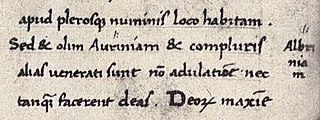
Albruna, Aurinia or Albrinia are some of the forms of the name of a probable Germanic seeress who would have lived in the late 1st century BC or in the early 1st century AD. She was mentioned by Tacitus in Germania, after the seeress Veleda, and he implied that the two were venerated because of true divine inspiration by the Germanic peoples, in contrast to Roman women who were fabricated into goddesses. It has also been suggested that she was the frightening giant woman who addressed the Roman general Drusus in his own language and made him turn back at the Elbe, only to die shortly after, but this may also be an invention to explain why a consul of Rome would have turned back. In addition, there is so little evidence for her that not every scholar agrees that she was a seeress, or that she should be included in a discussion on them. She may also have been a minor goddess, a matron.

"Hermann und Thusnelda" is a poem written in 1752 by Friedrich Gottlieb Klopstock exalting the Cheruscan chieftain Arminius, whom Johannes Turmair and Martin Luther named Hermann in the 16th century, and his wife Thusnelda. The poem was set to music by Franz Schubert in 1815 (D 322).
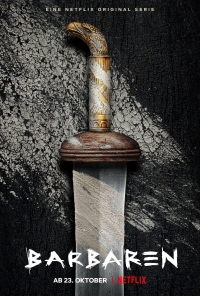
Barbarians is a 2020 German historical war drama television series created by Andreas Heckmann, Arne Nolting, and Jan Martin Scharf. It stars Laurence Rupp, Jeanne Goursaud, and David Schütter. The series is a fictionalized account of events during the Roman Empire's occupation of Germania, and the subsequent rebellion of some Germanic tribes led by Arminius. The series was renewed for season 2 on November 10, 2020. It was released on Netflix on October 21, 2022.
Max Bruch composed a number of choral works that were, during his lifetime, judged to be his most successful pieces. Instrumental music makes up only about a third of Bruch’s total output, while vocal music forms a considerably larger proportion. These works are described variously as oratorios and cantatas. His oratorios are generally held to represent the best of his vocal writing. Some were of a religious character but many were based on mythological themes.
References
- ↑ Howard E. Smither, A History of the Oratorio: The oratorio in the nineteenth and twentieth Centuries, The University of North Carolina Press, p. 107.
- ↑ Alexander Schmidt, Vaterlandsliebe Und Religionskonflikt: Politische Diskurse Im Alten Reich, Brill Publishers, p. 125.
- ↑ Ernst Baltrusch, Morten Hegewisch, Michael Meyer, Uwe Puschner, Christian Wendt (ed.). 2000 Jahre Varusschlacht: Geschichte – Archäologie – Legenden, De Gruyter, p. 67.
- ↑ Ernst Baltrusch, Morten Hegewisch, Michael Meyer, Uwe Puschner, Christian Wendt (ed.). 2000 Jahre Varusschlacht: Geschichte – Archäologie – Legenden, De Gruyter, p. 267.
- ↑ Both the German libretto and the English translation thereof: Booklet, Max Bruch. Arminius. NDR 1 Niedersachsen.
- ↑ Barbara Eichner, History in Mighty Sounds: Musical Constructions of German National Identity, p. 172–181.